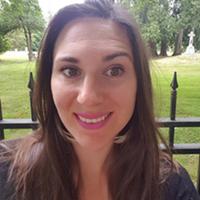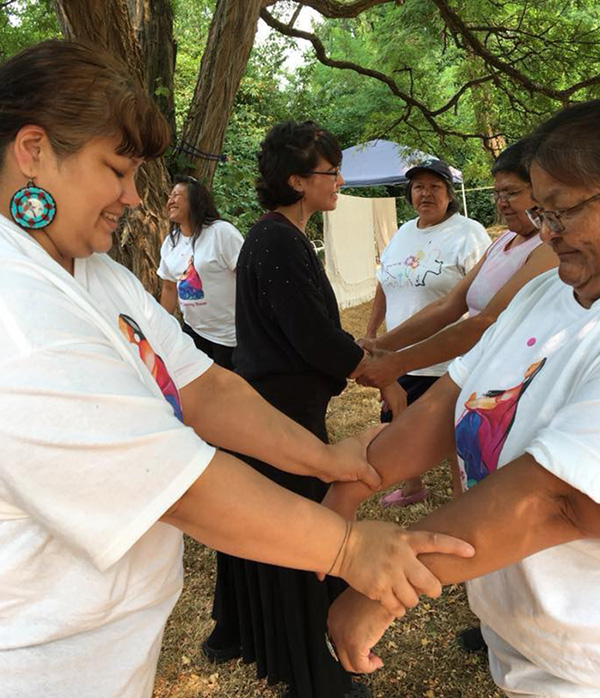“Healing” through self-defence. That’s what Patty Stonefish teaches. Not fear, not anger, not violence — and definitely not feeling responsible for anyone else’s abusive behaviour.
Stonefish teaches women how to move beyond the hurt, in more ways than one.
“I can’t stand this rhetoric of ‘you should be able to fight someone off,’ because it’s not our responsibility. At the end of the day, women’s self-defence is a great tool of healing and self-empowerment, but it is not our fault for not stopping a sexual assault,” said Stonefish from her home base in Seattle, Washington.
“I think the rhetoric and the perspective through which women’s self-defence is taught should be given a second look. And it can be very hurtful when taught the wrong way,” she added.
Stonefish is a woman of mixed Lakota, Polish and Russian descent from North Dakota. She is only 27 years old, but her life experiences have been profound in that short time.*
Stonefish began martial arts when she was 13, one year after she was sexually assaulted for the first time. She had just decided she wanted to join the army, but her mother told her she needed to learn how to defend herself first, so enrolled her in taekwondo.
Stonefish hated it, until it came to learning how to fight. Suddenly she felt stronger than she ever had, and something inside her was awakened.
“You feel so weak after a sexual assault. And being reminded how powerful we are.... That’s what I really latched onto. The ability to be like, ‘Wow, I am strong. I just didn’t know how to use my strength. It’s there,’” she said.
After a few years, she switched to a focus strictly on self-defence — learning it, then later helping to instruct courses. At one point she moved to Cairo, Egypt, because her instructor lived there. It was an adventure she was interested in having, and she had been travelling there periodically to train anyway.
Arming Sisters was born out of the madness she saw during the Arab Spring uprisings in 2010 and 2013. Witnessing this firsthand had a deep impact on her, and she felt called to act.
She saw the extreme patriarchy women were fighting against in Egypt and thought about what things were like back home. Knowing that Indigenous women in America (and Canada) were at a significantly greater risk of experiencing violence and sexual assault than any other group, she felt there was no better place to share her medicine than there, in her homeland.
“It really changed the entire culture, and being there to witness that and see so much, it really helped me grow as a person. And it shifted my perspective around a lot of things, especially rape culture and patriarchal ideals,” she said.
This is why her stance in class is to also make other women aware of their own inner power. With only five to 10 moves each session (as opposed to the some 50 moves taught in other self-defence classes), she shows women how to take down an aggressor, while also learning that they too can be strong.
And she has found her approach to be successful — she has seen women transform in just one session.
One student, who she still keeps in contact with, stands out to her as a testament to what’s possible — and why she will continue this work, she said.
“There was one lady who came into the course, and she was just a week out of leaving a domestic violence situation. She, like many Native women, had been sexually assaulted many times in her life. And she was dealing with addictions because of self-medicating and coping habits we sometimes develop. She was really down and out,” said Stonefish.
After learning just a few of Stonefish’s moves, the woman’s attitude changed dramatically. Stonefish noticed her standing taller and looking more vibrant, as well as talking and laughing with other women, despite seeming so defeated earlier.
“She pinpointed that day as making her feel strong again. And where she’s at now, she has full custody of her children, and she’s in college,” said Stonefish.
Stonefish has taught all over the U.S., making her way from coast to coast, and will be coming to Canada for the first time to teach next week.
She is being flown in by the Pacific Association of First Nations Women to teach two classes: one to Indigenous female youth on Friday, Nov. 2, and another to Indigenous female adults on Saturday, Nov. 3. Both are part of the association’s Missing and Murdered Indigenous Women prevention initiatives.
Diana Day is the lead matriarch for the association, and she also belongs to Sister Watch and the MMIW coalition. She hopes the class will at least be one remedy for this national crisis.
“We must be proactive and build capacity in our women and youth to protect themselves and their children from those who are out to harm and hurt them. We must teach our youth and women how to respond to violence against us. For far too long our women have been hunted, attacked, gone missing and often murdered,” she wrote in an email to The Tyee.
“This class will bring hope to Indigenous women and youth. It will build confidence, and [bring] clarity to Indigenous women on ways to identify healthy relationships, toxic relationships and how to protect themselves from becoming one of the statistics,” Day said.
* This story was updated on Nov. 1, 2018 at 2:10 p.m. to correct Patty Stonefish’s age.
Read more: Indigenous, Rights + Justice, Gender + Sexuality
















Tyee Commenting Guidelines
Comments that violate guidelines risk being deleted, and violations may result in a temporary or permanent user ban. Maintain the spirit of good conversation to stay in the discussion.
*Please note The Tyee is not a forum for spreading misinformation about COVID-19, denying its existence or minimizing its risk to public health.
Do:
Do not: